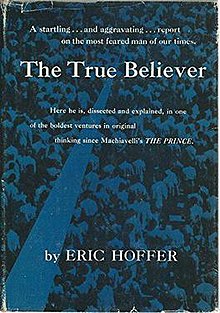The True Believer

Cover of the first edition
|
|
| Author | Eric Hoffer |
|---|---|
| Country | United States |
| Language | English |
| Subject | Social psychology, Fanaticism |
| Publisher | Harper & Brothers |
|
Publication date
|
1951 |
| Pages | 176 |
| ISBN | |
| OCLC | 422140753 |
| 303.48/4 21 | |
| LC Class | HM716 .H63 2002 |
The True Believer: Thoughts On The Nature Of Mass Movements is a 1951 social psychology book by American writer Eric Hoffer, in which Hoffer discusses the psychological causes of fanaticism.
Hoffer analyzes and attempts to explain the motives of the various types of personalities that give rise to mass movements; why and how mass movements start, progress and end; and the similarities between them, whether religious, political, radical or reactionary. He argues that even when their stated goals or values differ, mass movements are interchangeable, that adherents will often flip from one movement to another, and that the motivations for mass movements are interchangeable. Thus, religious, nationalist and social movements, whether radical or reactionary, tend to attract the same type of followers, behave in the same way and use the same tactics and rhetorical tools. As examples, he often refers to Communism, Fascism, National Socialism, Christianity, Protestantism, and Islam.
The first and best-known of Hoffer's books, The True Believer has been published in 23 editions between 1951 and 2002.
Hoffer states that mass movements begin with a widespread "desire for change" from discontented people who place their locus of control outside their power and who also have no confidence in existing culture or traditions. Feeling their lives are "irredeemably spoiled" and believing there is no hope for advancement or satisfaction as an individual, true believers seek "self-renunciation." Thus, such people are ripe to participate in a movement that offers the option of subsuming their individual lives in a larger collective. Leaders are vital in the growth of a mass movement, as outlined below, but for the leader to find any success, the seeds of the mass movement must already exist in people's hearts.
While mass movements are usually some blend of nationalist, political and religious ideas, Hoffer argues there are two important commonalities: "All mass movements are competitive" and perceive the supply of converts as zero-sum; and "all mass movements are interchangeable." As examples of the interchangeable nature of mass movements, Hoffer cites how almost 2000 years ago Saul, a fanatical opponent of Christianity, became Paul, a fanatical apologist and promoter of Christianity. Another example occurred in Germany during the 1920s and the 1930s, when Communists and Fascists were ostensibly bitter enemies but in fact competed for the same type of angry, marginalized people; Nazis Adolf Hitler and Ernst Röhm, and Communist Karl Radek, all boasted of their prowess in converting their rivals.
...
Wikipedia
